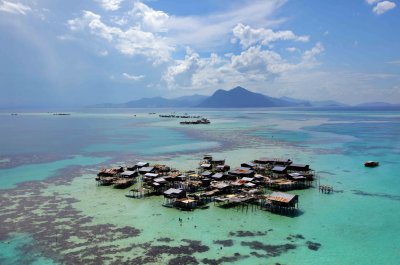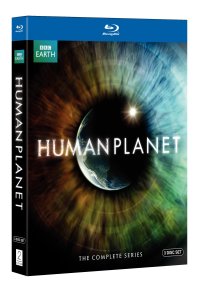Human Planet DVD Set Profiles Extreme Divers
On April 26, 2011, the Human Planet DVD set was released for sale; I have been fortunate enough to review the entire series over last week.
Human Planet is an eight part documentary series that profiles how humans have adapted to live in various climates and regions throughout the Earth – Oceans, Deserts, Arctic, Jungles, Mountains, Grasslands, Rivers and Cities.
After three years of filming in 80 countries, the end result is one of the most breath taking and beautifully filmed documentaries that I’ve ever seen – quite a nice change from the warmed over sitcoms and fake “reality” shows that seem to inundate television today.
The DVD set also has over three hours of previously unseen footage, including a portion called “Human Planet Behind The Lens,” which shows how some of the scenes were shot and the crew’s interaction with the subjects.
The first series is “Oceans – Into the Blue” – how humans live and have adapted to living in, on top of, and around the oceans.

One of the sections in this episode profiles compressor divers in the Philippines – divers who dive to 130 feet, for sometimes hours at a time, herding fish into nets and breathing off of plastic hoses of compressed air, without a regulator, and all for $25 a week.
For the readers who may not know what a regulator is, it is a piece of diving equipment that adjusts the pressure of compressed air to match the surrounding water pressure and give air only on demand.
Without a regulator, these guys are breathing off a tube that constantly streams compressed air down their throats, sort of like breathing off a regulator that is free flowing.
These are the most insane divers that I’ve ever heard of!
The “Behind The Lens” portion of the first DVD documents the relationship that developed between the BBC photographers and the compressor divers, which I found to be equally as fascinating as the original story.
To view this video on YouTube, click here.
The end of the first episode profiles the nationless Bajau people in the Coral Sea, near Borneo.

They actually live in houses that are raised above the water.
One of the inhabitants is a free diver who, on one breath, can dive 65 feet under water and hunt for up to five minutes.
Taking water pressure into consideration, I bet this man can hold his breath for 15 minutes on the surface.
To view this video on YouTube, click here.
Have you ever seen someone walking along the ocean bottom, holding their breath at 65 feet below the surface?
The whole series is as fascinating as the first episode.
Many times I would look at a scene and think, “That guy is crazy” – but then I would think, “How the hell did they film that?”
Again, the “Behind The Lens” section at the end of each episode tells how some of it was done.
The below video will give you an idea of the astounding photography in this documentary series:
To view this video on YouTube, click here.
After viewing all eight of the episodes, there is one fact that I will retain for the rest of my life – “Tarantulas taste better when they’re cooked like marshmallows!”
That tidbit of information I got from Episode 4: Jungles – People of the Trees, when they profiled tarantula hunting in Venezuela.
It was said in such a matter of fact way that I found it very funny.
This being a BBC documentary, pretty much everything is referenced in metric measurements, and being an American, I don’t think right off hand in metric measurements.
When I heard of the Mali desert being sweltering hot at 45 degrees, I had to think – “Oh, yeah, metric! Double it and add 30.”
I actually had to stop the DVD and figure out how deep 40 meters is – 130 feet.
An American measurement subtitle option would have been a nice feature, but now I’m a lot better at the metric system.
As my British friend told me, “If you have at least two functioning brain cells, the metric system is actually easier than the Imperial System.”
The Human Planet DVD series is a welcomed addition to my DVD collection!
More clips from Human Planet are available here:
To view this video on YouTube, click here.
Human Planet arrived on DVD and Blu-ray April 26, just two days following the broadcast conclusion. You can also catch Human Planet on the Discovery Channel April 17 and 24 at 8pm. To learn more about Human Planet you can visit the official website at www.HumanPlanetBlog.com or on Facebook at www.Facebook.com/HumanPlanetTVSeries.



